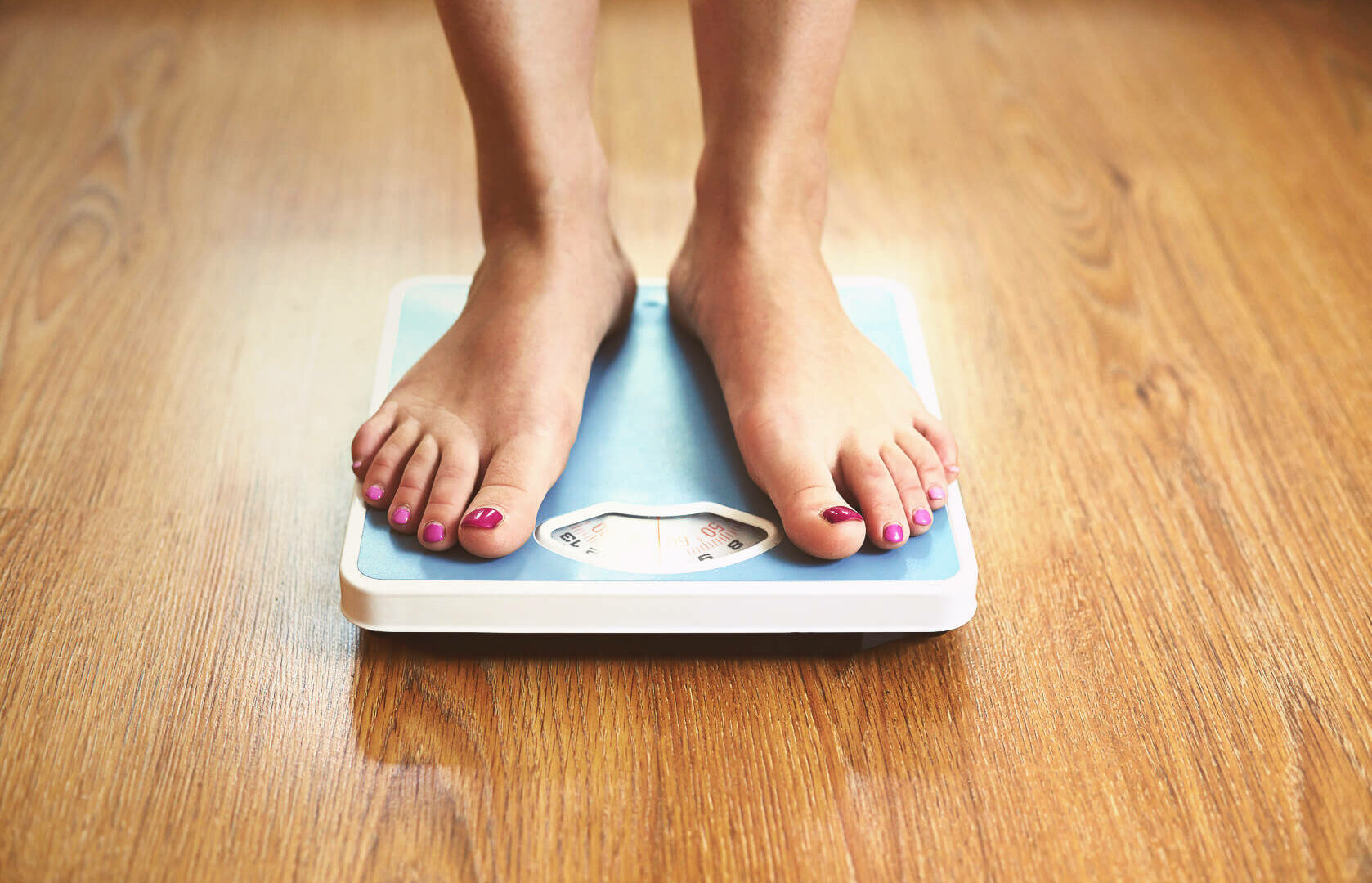The scale is a common tool used to assess progress during a fat loss phase. Weighing is quick and relatively inexpensive. With weighing, progress can assessed within a couple of weeks compared to other methods of measuring progress such as body measurements or progress pictures which can take longer to change.
While change in body composition can occur without the scale moving, for an experienced natural lifter the scale is most likely going to need to trend down to see significant change in body composition (for more on this check out my previous article: Can Natural Competitors Expect to Grow into a Show?)
For these reasons, weighing can be a valuable tool to assess progress, but how frequently should an individual weigh?
The purpose of this article is to review the scientific literature on frequent weighing and weight control. From there, practical recommendations will be given for those using the scale to monitor progress.
Does frequent weighing increase weight loss?
Weighing is a common component of weight loss interventions in scientific literature. Multiple research reviews and meta-analysis have concluded that self-weighing either alone or as part of a multi-factorial weight loss intervention results in greater weight loss [1][2][3].
In addition, numerous interventions that have included daily weighing have observed significantly greater weight loss [4][5][6]. Individuals who weighed daily were also found to have a lower calorie intake and a trend for an increase in activity compared to those who did not [4].
Multiple reviews of literature on this topic have also concluded that daily weighing interventions improve weight loss [2][3]. Moreover, participants in daily weighing interventions have reported high levels of satisfaction with the intervention [5].
Does frequent weighing improve weight maintenance?
There are a number of ways to create an energy deficit and lose weight. As a result, many individuals lose weight; however, most re-gain the weight lost. Clearly, body weight maintenance following a weight loss intervention is key to long-term success.
Numerous studies have investigated the effects of frequent weighing on body weight maintenance after weight loss. These studies have primarily been performed in those who began the weight loss intervention overweight or obese.
In a study of over 3000 overweight or obese individuals who lost at least 30lbs and kept it off for at least 1 year, researchers observed that those who reduced weighing frequency during the year of follow up re-gained more weight than participants who either maintained or increased the frequency they stepped on the scale [7].
A number of other studies have also observed that frequent [8][9] and daily [10][11] weighing resulted in reduced weight re-gain. Moreover, daily weighing during post-diet weight maintenance increased dietary restraint and reduced binging [11].
As an interesting related side note, daily weighing has also been show to prevent the “freshman 15” in college students [12].
Based upon this data it is clear that daily weighing can be a powerful tool to help prevent weight gain.
Is it better to weigh more frequently?
Based upon the previous data, it is clear that self-weighing can be an effective tool to increase weight loss and improve weight maintenance following a weight loss intervention. But, how frequently does an individual need to step on the scale to observe benefits from self-weighing?
A recent weight loss intervention in obese adults that included daily weighing observed that for every 11 days an individual self-weighed, they lost an additional 1 lb. In addition, those who self-weighed at least twice weekly were significantly more likely to lose at least 5 percent of their body weight during the intervention [13]. Moreover, following weight loss those who reduced weighing frequency re-gained more body weight than individuals who either increased or did not change how frequently they weighed [7].
Looking specifically at studies comparing daily weighing to those where individuals weighed weekly or monthly, typically the more frequent individuals step on the scale, the better the outcome. Daily weighing has been shown to prevent weight gain, but monthly did not [14]. Similarly, daily weighing has also been shown to result in more weight loss than weekly weighing [4]. In addition, breaks in daily weighing of greater than 1 week were associated with weight-regain with longer breaks correlated with a larger risk of re-gain [15].
Based upon this data, daily weighing appears to be the best choice; however, even more frequent weighing has also been investigated. Weighing twice daily (morning and night) was shown to result in more loss than weighing once daily [16].
Taken together, these studies suggest that more is better when it comes to weighing frequency.
Are there any negative effects to weighing frequently?
While the previous data does suggest that weighing more frequently is better when it comes to stepping on the scale, it is reasonable to hypothesize that at some point increasing weighing frequency could lead to an obsessive and negative relationship with the scale.
Fortunately, a number of studies have investigated the psychological effects of frequent weighing. However, these studies have found very mixed results.
Many studies have observed no negative psychological effects of frequent weighing [5][6]. As a result, multiple literature reviews have concluded that frequent and daily weighing do not have adverse psychological effects [1][2].
Some studies have even observed beneficial psychological effects of frequent weighing. A reduction in body dissatisfaction was observed after a 6 month weight loss intervention that included daily weighing [17]. Similarly, daily weighing during post-diet weight maintenance was associated with increased dietary restraint, decreases in depression and reduced binging [11]. However, these findings may be confounded by the fact that frequently weighing results in greater weight loss and weight maintenance; therefore, improving body image.
However, other studies have observed detrimental effects of frequent weighing. Frequent self-weighing in college students has been associated with negative effects on body image [18]. Moreover, increased weighing frequency has been associated with increased dieting and unhealthy weight control behaviors [19].
Taken together, this data suggests that the psychological effects of weighing frequently may vary greatly from person to person. Some individuals may have no issues whatsoever weighing frequently while others may be better served weighing less frequently.
How do I use the scale to assess progress?
For many individuals the scale can be a great tool to help monitor progress without psychological consequence. If you are someone who plans to use the scale to track progress there are a few things to consider.
Body weight will normally fluctuate a couple pounds daily. This is due to a number of factors such as: water intake, salt intake, stress, hormones, illness, medication, sleep patterns, length of time from your last food/drink to your weigh-in, sweat, bowel movements and a number of other factors. Therefore, it is going to be important to look at averages of longer period of time (e.g. weekly) rather than stressing over fluctuation from day to day. It will also be important for females to account for their monthly cycle when assessing body weight change.
To minimize the variation in weigh-ins, it will be important to weigh in at the same time of day under the same conditions. Typically, the easiest way to do this is to weigh on the same scale first thing in the morning each day prior to eating or drinking.
Lastly, one important thing to keep in mind is that the scale is only one tool that can be used to assess progress. If you are going to use the scale it will also be important to use it in combination with other markers of progress such as: progress pictures, performance in the gym, body measurements and how your clothes are fitting.
Take Home Points:
Frequent or daily weighing has been shown to increase weight loss during a weight loss intervention. Moreover, frequent weighing has been shown to be effective at minimizing weight regain post-diet.
Weighing daily appears to be more effective than stepping on the scale less frequently.
The psychological effects of weighing frequently can vary greatly from person to person. Some individuals experience no detrimental effects from stepping on the scale frequently while others experience negative psychological effects. If you find you are someone who starts to become obsessed with the scale, it may be best to use other methods to track progress besides frequent weighing.
If you are going to use the scale, weigh daily under the same conditions, look at averages rather than individual weigh-ins and use the scale in combination with other markers of progress such as progress pictures, body measurements and performance in the gym.
References
- Shieh, C., et al., Self-weighing in weight management interventions: A systematic review of literature. Obes Res Clin Pract, 2016. 10(5): p. 493-519.
- Zheng, Y., et al., Self-weighing in weight management: a systematic literature review. Obesity (Silver Spring), 2015. 23(2): p. 256-65.
- Madigan, C.D., et al., Is self-weighing an effective tool for weight loss: a systematic literature review and meta-analysis. Int J Behav Nutr Phys Act, 2015. 12: p. 104.
- Steinberg, D.M., et al., The efficacy of a daily self-weighing weight loss intervention using smart scales and e-mail. Obesity (Silver Spring), 2013. 21(9): p. 1789-97.
- Gokee LaRose, J., et al., Preventing weight gain in young adults: a randomized controlled pilot study. Am J Prev Med, 2010. 39(1): p. 63-8.
- Welsh, E.M., et al., Is frequent self-weighing associated with poorer body satisfaction? Findings from a phone-based weight loss trial. J Nutr Educ Behav, 2009. 41(6): p. 425-8.
- Butryn, M.L., et al., Consistent self-monitoring of weight: a key component of successful weight loss maintenance. Obesity (Silver Spring), 2007. 15(12): p. 3091-6.
- Madigan, C.D., et al., Regular self-weighing to promote weight maintenance after intentional weight loss: a quasi-randomized controlled trial. J Public Health (Oxf), 2014. 36(2): p. 259-67.
- Fujimoto, K., et al., Charting of daily weight pattern reinforces maintenance of weight reduction in moderately obese patients. Am J Med Sci, 1992. 303(3): p. 145-50.
- Wing, R.R., et al., A self-regulation program for maintenance of weight loss. N Engl J Med, 2006. 355(15): p. 1563-71.
- Wing, R.R., et al., STOP regain: are there negative effects of daily weighing? J Consult Clin Psychol, 2007. 75(4): p. 652-6.
- Levitsky, D.A., et al., Monitoring weight daily blocks the freshman weight gain: a model for combating the epidemic of obesity. Int J Obes (Lond), 2006. 30(6): p. 1003-10.
- VanWormer, J.J., et al., Self-weighing promotes weight loss for obese adults. Am J Prev Med, 2009. 36(1): p. 70-3.
- VanWormer, J.J., et al., Self-weighing frequency is associated with weight gain prevention over 2 years among working adults. Int J Behav Med, 2012. 19(3): p. 351-8.
- Helander, E.E., et al., Are breaks in daily self-weighing associated with weight gain? PLoS One, 2014. 9(11): p. e113164.
- Oshima, Y., Y. Matsuoka, and N. Sakane, Effect of weight-loss program using self-weighing twice a day and feedback in overweight and obese subject: a randomized controlled trial. Obes Res Clin Pract, 2013. 7(5): p. e361-6.
- Steinberg, D.M., et al., Daily self-weighing and adverse psychological outcomes: a randomized controlled trial. Am J Prev Med, 2014. 46(1): p. 24-9.
- Klos, L.A., V.E. Esser, and M.M. Kessler, To weigh or not to weigh: the relationship between self-weighing behavior and body image among adults. Body Image, 2012. 9(4): p. 551-4.
- Quick, V., et al., Self-weighing behaviors in young adults: tipping the scale toward unhealthy eating behaviors? J Adolesc Health, 2012. 51(5): p. 468-74.

